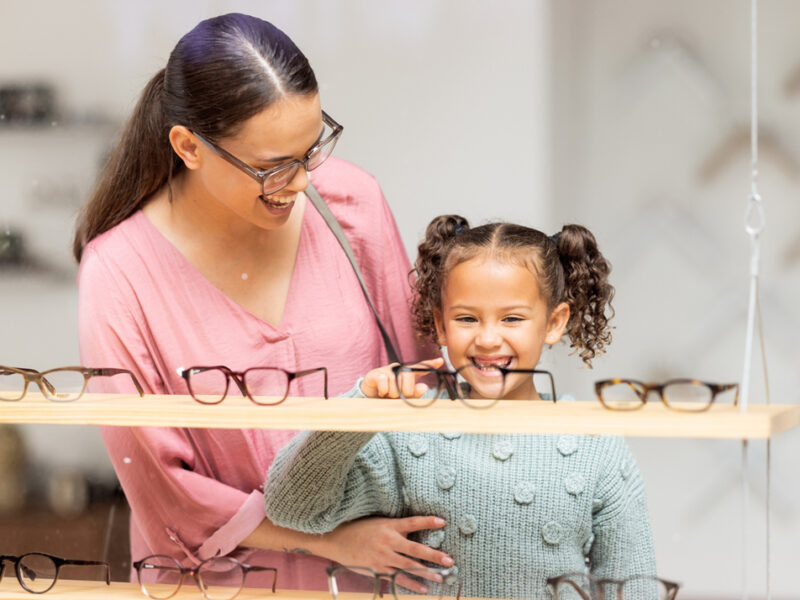Choosing Glasses and Contact Lenses for Kids

Children’s Eyewear Options
Navigating the world of vision correction for your child involves considering various factors, from glasses styles to contact lens options. Whether your child prefers the convenience of contact lenses or the fashion-forward appeal and ease of glasses, it’s essential to make informed decisions that prioritize their comfort and visual health. In this comprehensive guide, we’ll explore how to choose the right glasses and contact lenses for your child, ensuring optimal vision correction and confidence.
Understanding Your Child’s Needs
Before making any decisions about contacts or glasses, it’s crucial to understand your child’s unique vision requirements. Schedule a comprehensive eye exam with an optometrist or ophthalmologist to assess your child’s visual health and determine if corrective lenses are necessary. Armed with this information, you can confidently explore options tailored to your child’s prescription and lifestyle.
Choosing Glasses for Children: When selecting glasses for your child, consider factors like frame material, fit, style, and lens options to ensure a comfortable and stylish choice. Involve your child in the decision-making process to empower them and boost their confidence in wearing glasses regularly. Additionally, prioritize follow-up care and regular eye exams to monitor your child’s vision and ensure their glasses provide optimal correction.
Choosing Contact Lenses for Children: Contact lenses offer a convenient and discreet alternative to glasses, especially for active children involved in sports and other physical activities. When choosing contact lenses for your child, consider factors like lens type (daily disposable, bi-weekly, or monthly), fit, and hygiene practices to ensure safe and comfortable wear. It’s essential to educate your child on proper contact lens care and hygiene habits to reduce the risk of eye infections and complications.
Combining Glasses and Contact Lenses: In some cases, your child may benefit from a combination of glasses and contact lenses, depending on their vision prescription and lifestyle preferences. This hybrid approach allows for flexibility and convenience while ensuring optimal vision correction in various situations. Work closely with your eye care provider to determine the best combination of eyewear options for your child’s unique needs.
Factors to Consider When Choosing Glasses
When selecting glasses for your child, consider the following factors to ensure a perfect fit and optimal comfort:
- Frame Material: Opt for lightweight, durable materials like acetate or flexible plastic that can withstand the rigors of daily wear and play.
- Frame Fit: Ensure the glasses fit snugly but comfortably on your child’s face, with the bridge sitting comfortably on the nose and the temples resting securely behind the ears.
- Style Preference: Involve your child in the decision-making process by letting them choose frames in colors and styles that reflect their personality and preferences.
- Lens Options: Consider lens features like scratch-resistant coatings, UV protection, and blue light filtering to enhance visual clarity and protect your child’s eyes from harmful rays.
- Adjustability: Look for glasses with adjustable nose pads and temple arms to accommodate growth spurts and ensure a custom fit as your child grows.
Tips for a Successful Glasses Fitting
Make the glasses fitting experience enjoyable and stress-free for your child with these helpful tips:
- Involve Your Child: Let your child try on different frames and express their opinions to make them feel empowered and excited about their new glasses.
- Ensure Comfort: Ensure the frames feel comfortable and secure on your child’s face, with no pinching or slipping.
- Encourage Consistent Wear: Emphasize the importance of wearing glasses consistently to correct vision problems and protect their eyes from strain and fatigue.
- Follow-Up Care: Schedule regular follow-up appointments with your eye care provider to monitor your child’s vision and ensure their glasses are still providing optimal correction.
Choosing the right eyewear for your child involves careful consideration of their vision needs, lifestyle preferences, and comfort. Whether you opt for glasses, contact lenses, or a combination of both, prioritize regular eye exams and follow-up care to ensure optimal vision correction and eye health. By involving your child in the decision-making process and prioritizing their comfort and confidence, you can empower them to embrace their eyewear with confidence.
